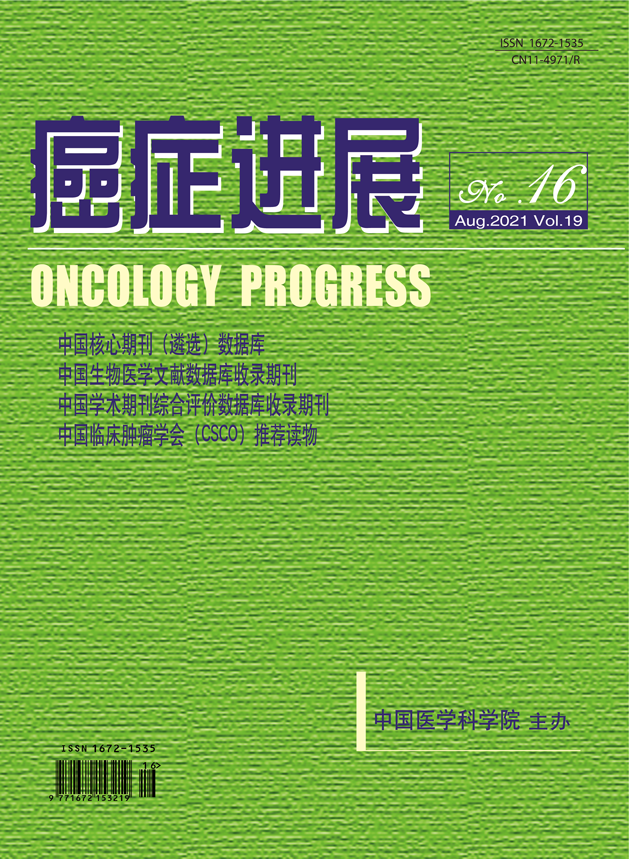杂志信息/Information

- 刊名:癌症进展
- Oncology Progress Journal
- 主管:国家卫生健康委员会
- 主办:中国医学科学院
- 社长:张凌
- 主编:赵平
- 编辑部主任:穆红
- 出版单位:中国协和医科大学出版社有限公司
《癌症进展》编辑部
100730,北京东单三条9号
联系电话:010-57528109
E-mail:azjzzz@163.com
http://www.aizhengjinzhan.com - 印刷:北京联合互通彩色印刷有限公司
- 国内统一连续出版物号:CN 11-4971/R
- 国际标准连续出版物号ISSN 1672-1535
下载专区/Download
订阅电子期刊/Subscribe
提交您的邮箱地址,我们会定期将电子期刊 发送到您的邮箱
期刊检索/Journal Search
扫一扫,关注

2017 年第 2 期 第 15 卷
晚期非小细胞肺癌中淋巴结转移与EGFR突变的相关性及对患者预后的影响
作者:
单位:
- 摘要:
- 【摘要】目的 探索晚期非小细胞肺癌中淋巴结转移与EGFR突变状态的相关性及对患者总生存的预测价值。方法 回顾性分析2007年1月至2014年12月间惠州市中心人民医院收治的1358例晚期非小细胞肺癌患者的临床病理和随访资料,Kaplan-Meier法进行疾病总生存率(overall survival,OS)分析并采用Log-rank检验进行比较。结果 1358例非小细胞肺癌中N0-1患者325例(24%),N2-3患者1033例(76%)。淋巴结转移阴性或仅有肺门淋巴结转移患者(N0-1)多为从不吸烟、EGFR突变型及M1a型患者。 Kaplan-Meier生存分析结果显示,N0-1组患者总生存时间显著长于N2-3组患者。按EGFR因素分层分析显示N0-1/EGFR突变型患者预后最好,N2-3/EGFR野生型患者预后最差,而N0-1/EGFR野生型与N2-3/EGFR突变型患者生存时间类似,处于上述二者之间;按M分期分层提示N0-1M1a患者预后最好,N2-3M1b患者预后最差,而N0-1M1b与N2-3M1a患者生存时间类似,处于上述二者之间。结论 非小细胞肺癌中淋巴结分期与EGFR突变状态显著相关,N0-1患者预后显著优于N2-3患者,同时EGFR状态及M分期可进一步影响上述两组患者的预后。
- Objective To explore t he correlation of lymph node metastasis with EGFR mutation and its predictive value of overall survival in patients of advanced non-small cell carcinoma (NSCLC). Methods A total of 1358 advanced NSCLC patients with long term follow-up from January 200 7 to December 2014 in Center of Huizhou City People’s Hospital were retrospectively analyzed in our study. Kaplan-Meier survival curve was used to analyze overall survival (OS) and Log-rank test was used to calculate P values. Results A total of 1358 NSCLC were divided into two groups: 325 patients (24%) with N0-1 staging and 1033 patients ( 76%) with N2-3 staging . Stage N0-1 was mostly presented in those patients who are nonsmoker, with EGFR mutation or at the stage of M1a. There was remarkable prolonged OS in the group of N0-1 than N2-3 analyzed by Kaplan-Meier survival curve. Based on EGFR mutational status stratification, the group of N0-1/EGFR+ showed the favorable prognosis, while the group of N2-3/EGFR- demonstrated worse prognosis, however, there was no significant difference between the group of N0-1/EGFR- and N2-3/EGFR+. Based on M staging stratification, the group of N0-1M1a showed the favorable prognosis, while the group of N2-3M1b demonstrated worse prognosis, however, there was no significant difference between the group of N0-1M1 b and N 2-3M1a. Conclusion There was significant correlation between N staging and EGFR mutational status in advanced NSCLC patients. Those with an early N staging (N0-1) patients seem to show a better overall survival than those with a late N staging (N 2-3). Meanwhile, EGFR status and M staging could also affect the prognosis between the two groups.








